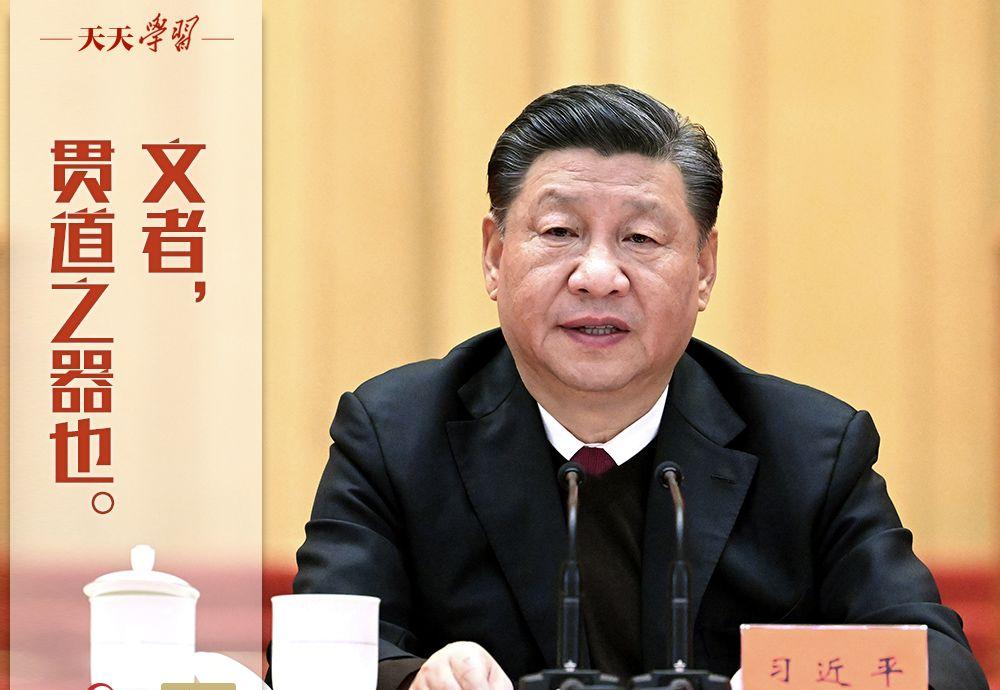Editor's note: Over the past hundred years, the Communist Party of China has handed over an excellent answer sheet to the people and to history. Now, the party has united and led the people of all nationalities throughout the country to embark on a new road of catching up with the examination to achieve the goal of the second centenary struggle. At the intersection of history and history of the "two hundred years" goal, we have embarked on a new journey of comprehensively building a modern socialist country, and are marching forward on the road of realizing the great rejuvenation of the Chinese nation with our heads held high.
Since the Eighteenth National Congress of the Communist Party of China, General Secretary Xi Jinping has repeatedly quoted scriptures and aided the past to prove the present, giving vivid connotations to the times and profoundly explaining the spiritual code of the CPC's original heart and enduring strength. CCTV "Daily Learning" specially planned the "Dian" bright new era series, and learned and understood with you.

【Definition】
In the history of ancient Chinese literary criticism, the relationship between "wen" and "Tao" has always been an important proposition explained by literary theorists of past generations. Han Yu, the leader of the Tang Dynasty's ancient literature movement, in order to oppose the Qijing literary style since the Six Dynasties, proposed to "revise his words to clarify his way" and "correct his way". His protégé Li Han wrote in the preface to the Collected Works of Mr. Changli: "The writer, the instrument of the way. This means that the article is a tool that runs through the "Tao", emphasizing that the article should solve real social problems. The above views actually reflect Han Yu's literary thought. On the basis of "literature through the Tao", the Northern Song Dynasty theorist Zhou Dunyi further put forward the idea of "literature with the Tao".
The Guwen movement advocated by Han Yu was based on his article "The Original Tao" as its program. Regarding the "Tao" of "Wen Yi Dao", he affirmed in the "Original Path": "The so-called Tao of Si Wu is not the so-called path of the old and the Buddha. Han Yu strictly limited "Taoism" to the scope of Confucian Taoism, rejected Buddhism and Taoism, and believed that only Confucianism could save the shortcomings and reshape the personality. He appointed himself as the successor of Confucian Taoism, and advocated the Guwen movement to save the decadence and aspire to revive Confucianism.
【Interpretation】
When culture is prosperous, the country is prosperous, and when culture is strong, the nation is strong. At the opening ceremony of the Eleventh National Congress of the China Federation of Literary and Art Circles and the Tenth National Congress of the China Writers Association, General Secretary Xi Jinping profoundly elaborated the important position and role of literature and art in comprehensively building a socialist modern country and realizing the Chinese dream of the great rejuvenation of the Chinese nation, and pointed out the way forward for Chinese literature and art in the new era.
The cultural movement is related to the national fortune, and the cultural context is connected with the national context. At present, the realization of the great rejuvenation of the Chinese nation has entered an irreversible historical process, and we are closer, more confident and capable of realizing the goal of the great rejuvenation of the Chinese nation than at any time in history. History and reality tell us that the direction, destiny and vitality of Chinese literature and art are closely related to this great historical process, and the development of Chinese literature and art is accompanied by the leap of the Chinese nation, and the direction of the unity and struggle of the Chinese people is the direction of Chinese literature and art.
Literary and art workers in the new era undertake the important mission of recording the new era, writing the new era, and praising the new era. In contemporary China, the country and mountains are magnificent, the people are heroic, and the future is far-reaching. The times have provided an unprecedented broad stage for the prosperity and development of mainland literature and art. To promote the prosperity and development of socialist literature and art and build a socialist cultural power, the vast number of literary and art workers are duty-bound and shoulder heavy responsibilities. Only when the vast number of literary and art workers are concerned about the great cause of national rejuvenation and enthusiastically depict the magnificent atmosphere of the new journey of the new era can they create outstanding works that are worthy of the times, the people, and the nation.
There is a road in the chest, and the bottom of the pen is thunderous. The vast number of literary and art workers must closely follow the pace of the times, feel the pulse of art from the pulse of the times, open up artistic creation to the great struggle of hundreds of millions of people, open up to rich and colorful social life, extract themes and extract themes from the changes of the times, the advance of China, and the cries of the people, show the beauty of Chinese history, the beauty of mountains and rivers, and the beauty of culture, express the aspirations of the Chinese people to struggle, the strength of creation, and the fruits of development, show the spiritual atmosphere of the new era in an all-round and panoramic manner, and realize the goal of the second centenary struggle. The Chinese dream of realizing the great rejuvenation of the Chinese nation provides a strong value guide, cultural cohesion and spiritual driving force.
(Author Yang Lixin)
(CCTV)